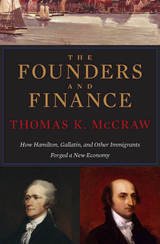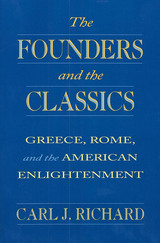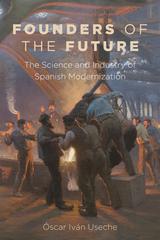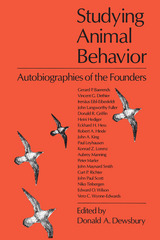
In 1776 the United States government started out on a shoestring and quickly went bankrupt fighting its War of Independence against Britain. At the war’s end, the national government owed tremendous sums to foreign creditors and its own citizens. But lacking the power to tax, it had no means to repay them. The Founders and Finance is the first book to tell the story of how foreign-born financial specialists—immigrants—solved the fiscal crisis and set the United States on a path to long-term economic success.
Pulitzer Prize–winning author Thomas K. McCraw analyzes the skills and worldliness of Alexander Hamilton (from the Danish Virgin Islands), Albert Gallatin (from the Republic of Geneva), and other immigrant founders who guided the nation to prosperity. Their expertise with liquid capital far exceeded that of native-born plantation owners Washington, Jefferson, and Madison, who well understood the management of land and slaves but had only a vague knowledge of financial instruments—currencies, stocks, and bonds. The very rootlessness of America’s immigrant leaders gave them a better understanding of money, credit, and banks, and the way each could be made to serve the public good.
The remarkable financial innovations designed by Hamilton, Gallatin, and other immigrants enabled the United States to control its debts, to pay for the Louisiana Purchase of 1803, and—barely—to fight the War of 1812, which preserved the nation’s hard-won independence from Britain.

Is our Greek and Roman heritage merely allusive and illusory? Or were our founders, and so our republican beginnings, truly steeped in the stuff of antiquity? So far largely a matter of generalization and speculation, the influence of Greek and Roman authors on our American forefathers finally becomes clear in this fascinating book-the first comprehensive study of the founders’ classical reading.
Carl J. Richard begins by examining how eighteenth-century social institutions in general and the educational system in particular conditioned the founders to venerate the classics. He then explores the founders’ various uses of classical symbolism, models, “antimodels,” mixed government theory, pastoralism, and philosophy, revealing in detail the formative influence exerted by the classics, both directly and through the mediation of Whig and American perspectives. In this analysis, we see how the classics not only supplied the principal basis for the U.S. Constitution but also contributed to the founders’ conception of human nature, their understanding of virtue, and their sense of identity and purpose within a grand universal scheme. At the same time, we learn how the classics inspired obsessive fear of conspiracies against liberty, which poisoned relations between Federalists and Republicans.
The shrewd ancients who molded Western civilization still have much to teach us, Richard suggests. His account of the critical role they played in shaping our nation and our lives provides a valuable lesson in the transcendent power of the classics.


Viewed alternately as an obstacle to justice, an impediment to efficient government, and a tool by which some groups gain benefits and privileges at the expense of others, public administration threatens to become the whipping boy of American government. In this innovative look at the nation's bureaucracy, Michael W. Spicer revisits the values of the Constitution in order to reconcile the administrative state to its many critics.
Drawing on political and social philosophy, Spicer argues that there is a fundamental philosophical conflict over the role of reason in society between writers in public administration and the designers of the American Constitution. This examination of worldviews illuminates the problem that American government faces in trying to ground a legitimate public administration in the Constitution. Defending and developing the Founders' idea that political power, whatever its source, must be checked, he critically examines existing ideas about the role of public administration in American governance and offers an alternative vision of public administration more in line with the Founders' constitutional design. This book will provide fresh insights for anyone interested in the role of public administration in the United States today.

READERS
Browse our collection.
PUBLISHERS
See BiblioVault's publisher services.
STUDENT SERVICES
Files for college accessibility offices.
UChicago Accessibility Resources
home | accessibility | search | about | contact us
BiblioVault ® 2001 - 2024
The University of Chicago Press









